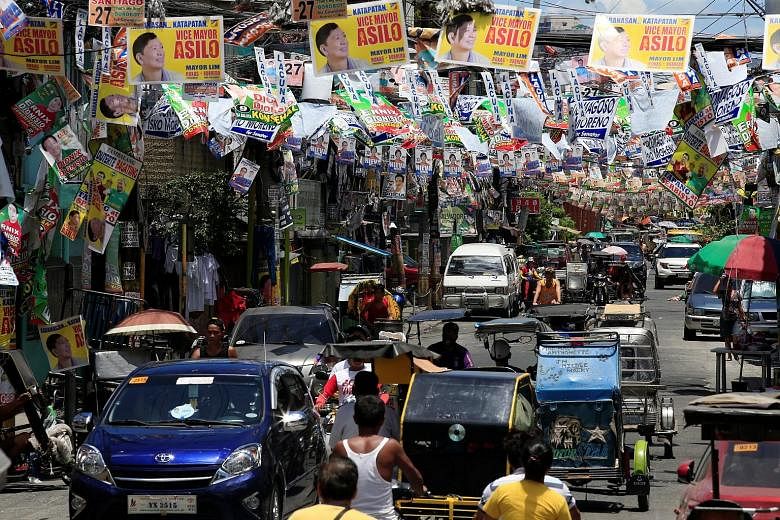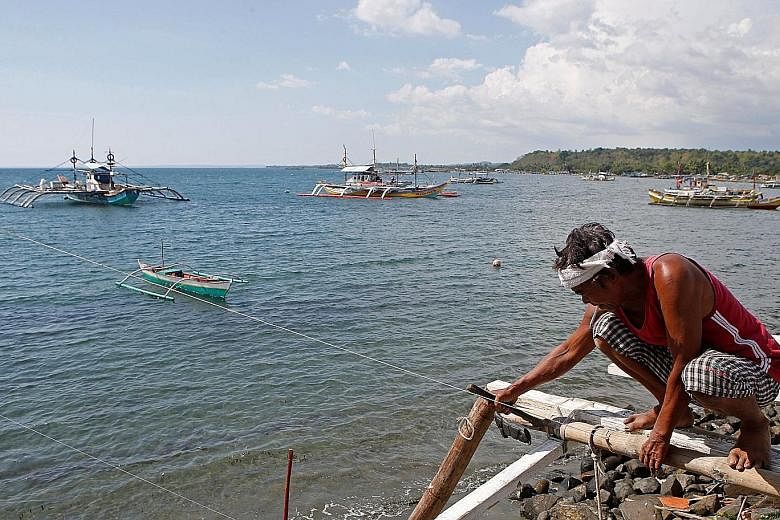By midweek, official results from today's presidential election in the Philippines will be released and how Filipinos voted will have serious consequences for the country and much of South-east Asia.
At stake are the huge gains from the highly successful reform agenda of outgoing President Benigno Aquino's six-year administration, which has turned the Philippines into the region's strongest-performing economy even as the country's importance in geopolitics grows, particularly with regard to what many view as China's expansionist strategy in the region.
The vexing issue in the polls is that the front runner in the multi- cornered contest for the nation's highest office, Mr Rodrigo Duterte, is a deeply polarising figure who will have to contend with vast sections in the country, including the military, who do not approve of his style.
"What we are seeing today is the prospect that the popular candidate is not a politician who has pledged to build on the economic and institutional reforms that have been going on," says a chief executive of a local conglomerate, echoing a widely held view among Manila's powerful business community.
Mr Duterte, the 71-year-old tough-talking mayor of Davao, is riding on a wave of voter dissatisfaction, particularly among the poor and widening middle-class, who insist that they have not benefited from the country's economic gains, and remain upset with crime and rampant corruption.
-
The candidates and their stand on...
-
FOREIGN POLICY
One foreign policy issue stands out for whichever candidate wins today's election - dealing with China over disputed territory in the South China Sea.
MAYOR RODRIGO DUTERTE
He has said he is willing to hold direct talks with China to settle rows over the South China Sea and is even willing to set aside the Philippines' claims to parts of these waters. He will abide by a recent, 10-year defence pact that allows the US to rotate troops on Philippine military bases, but he is likely to seek a review of the agreement's terms.
SENATOR GRACE POE
She supports the Philippines' case against China, but she also wants to improve relations with the regional powerhouse through deeper economic ties. She eschews a policy of relying on the US to prevent Chinese encroachments, and would rather see the Philippine military stand on its own.
FORMER INTERIOR MINISTER MAR ROXAS
He is considered a continuity candidate. He has said he will continue Mr Aquino's tough stance when dealing with China.
VICE-PRESIDENT JEJOMAR BINAY
He has the most China-friendly policy. Like Mr Duterte, he wants to hold direct talks with China on jointly tapping resources in the South China Sea.
SENATOR MIRIAM DEFENSOR SANTIAGO
She backs the Philippines' case against China, but also favours a "second level of diplomacy" in resolving rows over the South China Sea. She is the least US-friendly, and she is pushing to scrap the Philippine-US Visiting Forces Agreement and have the US troop rotation pact sent to the Senate for review.
Raul Dancel
-
ECONOMIC POLICY
Here's a look at some of the economic policy pronouncements of candidates vying for the top office in the Philippines.
MAYOR RODRIGO DUTERTE
He has disclosed only two major plans. One is related to infrastructure projects all over the country to spur economic activity, while the other is a rejection of calls for a cut in corporate taxes because he feels the government needs to beef up its financial position.
SENATOR GRACE POE
She is the least experienced candidate in the multi-cornered contest, but has presented the most impressive set of economic policies. Backed by respected technocrats and economists, she has pledged to develop the industrial sector, raise infrastructure spending and relax the 40 per cent cap on foreign ownership in certain sectors.
FORMER INTERIOR MINISTER MAR ROXAS
He has presented an economic platform that is mildly nationalistic. He has no intention to amend economic provisions in the Constitution, but has promised to promote business-friendly policies.
VICE-PRESIDENT JEJOMAR BINAY
He is also proposing to implement pro-business policies, speed up infrastructure spending, and cut corporate and personal taxes.
SENATOR MIRIAM DEFENSOR SANTIAGO
A key plank of her economic programme involves cracking down on corruption in revenue-generating agencies such as the Customs bureau. She wants to simplify the tax system to align it with the rest of Asean.
Leslie Lopez
Most recent opinion polls show Mr Duterte - who has made grand promises such as wiping out crime in three months and amending the Constitution - ahead by 11 percentage points over his closest rival, Senator Grace Poe.
Ordinarily, that margin is enough to secure the presidency. But in the crowded race of five candidates, analysts are not ruling out an upset because roughly 25 percent of voters remain undecided.
Ms Poe and the other high-profile candidate in third place in opinion polls, former interior minister Mar Roxas, are running on platforms to build on the gains of the Aquino administration and on establishing a pro-business environment.
Whatever the outcome, this year's presidential election has renewed foreign investor attention on the Philippines.
Under Mr Aquino, the sprawling archipelago enjoyed political stability and improved governance.
A focused economic reform agenda also helped deliver strong growth, upgrades in its sovereign ratings from international agencies and declining risk premiums to the stock market and the property sector.
The Philippines is the only country in Asean where the ratio of government debt-to-gross domestic product - a measure of a government's ability to repay its debt - has fallen.
From a high of 75 per cent in 2004, it currently stands at 45 per cent, giving the government in Manila more room for direct spending on much-needed improvements to infrastructure.
Several economists argue that the government's strong financial position will help the economy weather any immediate post-election volatility.
What's worrisome, however, is post-election politics.
Several analysts say that Mr Duterte's quick-fix promises during his campaign, such as to cut crime drastically in three months, are not realistic and are likely to lead to public dissatisfaction in the months ahead if he wins office.
His threat to abolish Congress is also likely to bring his opponents together to undermine his government and risk the return of the military to politics.
For regional governments, the big concern is centred on the hints that Mr Duterte has made with regard to his foreign policy, particularly in the country's dealings with China.
The Philippines is locked in a bitter territorial dispute with China over overlapping claims in the South China Sea.
The Aquino administration has taken a hardline approach towards the issue.
Mr Duterte is threatening to change tack and open direct negotiations with China, a move that would upend years of painstaking diplomacy by Asean.
SEE WORLD


